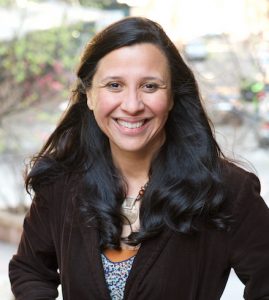Contributed by Samuel Martínez
From October 11 to October 22, 2021, El Instituto and the Department of Literatures, Cultures, and Languages hosted Sophie Maríñez, a 2021 Mellon/ACLS Fellow and a recipient of the Distinguished Teaching Award at Borough of Manhattan Community College, where she is a professor of Modern Languages and Literatures. Maríñez’ public presentation gave members of the UConn community and visitors who livestreamed the talk a preview of the book manuscript on which she is currently working, titled Spirals in the Caribbean: Representing Violence in Haiti and the Dominican Republic. In an additional paper workshop, she discussed a chapter-in-progress, “The Comegente (1791-1989).” During her visit to UConn, Maríñez also met with recently-hired probationary faculty of color to talk about the challenges of winning tenure and surviving emotionally in a White-dominated university environment, and visited a number of classes. Faculty and students in LCL, Philosophy, Political Science, and Anthropology, as well as El Instituto, gained nuanced insights into the Haitian-Dominican relationship through their intellectual exchange with Maríñez.
In addition to teaching at BMCC, Professor Maríñez has taught graduate courses on the literatures of Haiti, the Dominican Republic, and their respective diasporas at City College and The Graduate Center. Prior to her appointment at CUNY, she held a two-year visiting faculty position in French at Vassar College (2010-2012). From 1997 to 2000, she was a diplomat, working as a Cultural Counselor at the embassy of the Dominican Republic in Mexico.
Whereas Maríñez’ earlier work focused on French aristocratic women who used their writings and chateaux to establish authority, legitimacy, social status, and political identities, she has of late been drawn into an intensive engagement with the fraught relationship of the Dominican Republic with Haiti, its island neighbor. Specifically, she is seeking responses as a literature teacher and researcher to the human rights crisis into which Dominicans of Haitian ancestry have been thrown since a 2013 Dominican high court ruling stripped these people of their Dominican citizenship. International repudiation of the Dominican state’s racist policy of nationality-stripping has drawn her, as a politically-engaged feminist, decolonial and anti-racist scholar, to take on a close reading of musical, theatrical, literary and political projects of protest against Dominican nationalism’s toxic turn toward hostility with Haiti. In her book in progress, more specifically, she takes the highly original approach, as a fully French and Spanish bilingual cultural studies expert, of theorizing the Haitian/Dominican relationship through the lens of the Haitian literary movement of Spiralism. Many in the fields of Dominican, Haitian, and Antillean studies look forward with great anticipation to the paradigm-setting potential of Maríñez’ Spirals in the Caribbean project.
